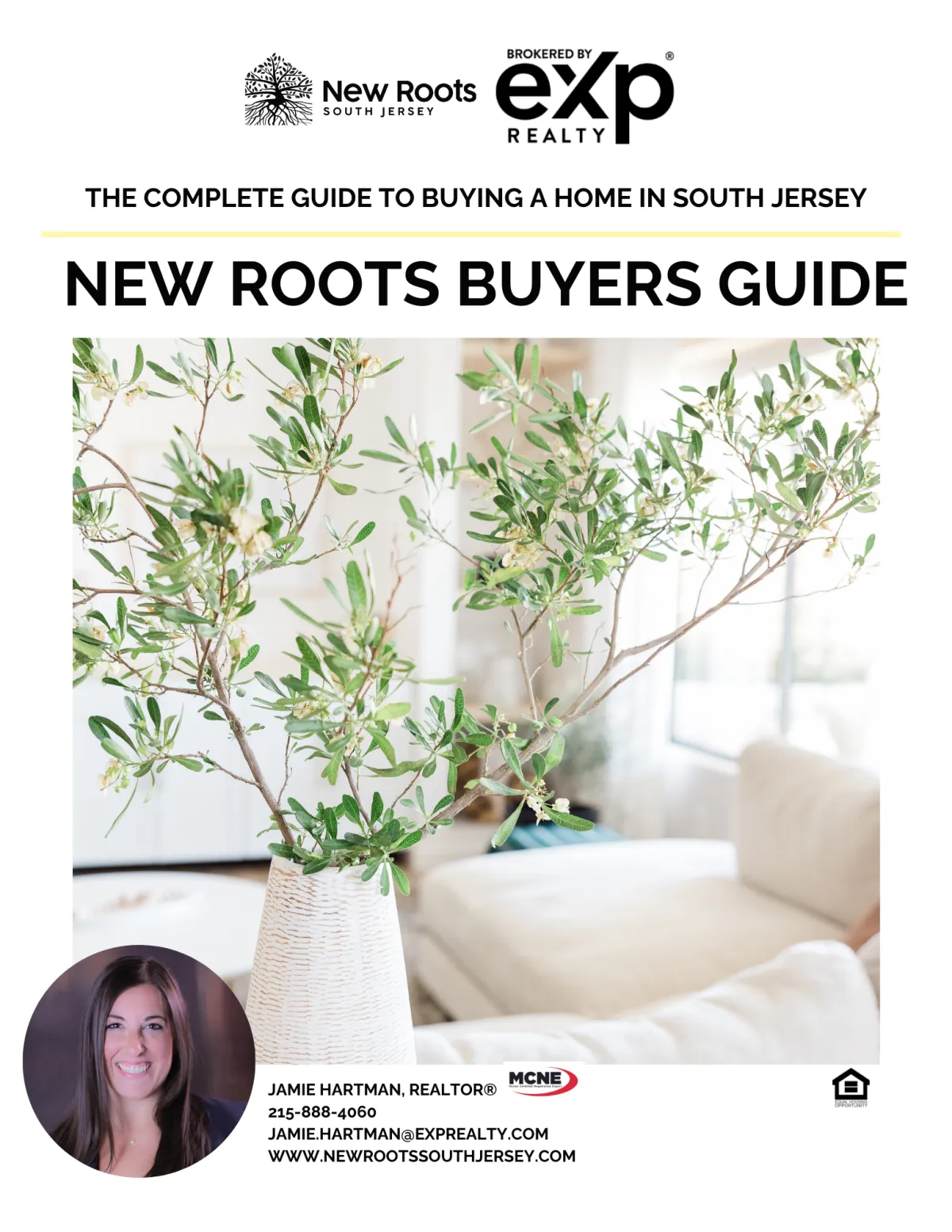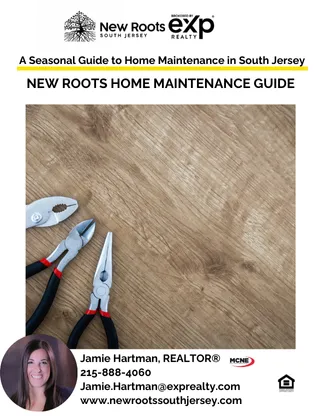Welcome to Your South Jersey Real Estate Resource Hub
Your go to place for real estate guides, checklists, tools, and tips that help you stay informed and confident at every step.
At New Roots South Jersey, we believe clear information helps people make better real estate decisions. That is why we offer free and easy to understand guides for home buyers and home sellers. These resources are designed to help you avoid common mistakes, understand the process, and feel supported from start to finish of your real estate journey.
NEW ROOTS BLOG

Your Handy Guidebook to Real Estate Jargon
Unless you are in the real estate business or are a seasoned buyer or seller, you probably haven’t heard of a lot of these real estate terms. Below are the main ones in alphabetical order that may come up throughout the process.
Agreement of Sale (AOS) – the contract that discusses the terms of the purchase of real estate.
Appraisal – in order to secure your mortgage, the bank will send an independent appraiser to determine the value of the home to ensure that they are paying for a mortgage that is equal to the value of the property.
Asbestos – a mineral that is often used in insulation and has been found to cause certain cancers. This is very common in the South Jersey area.
Attorney Review – The time period starting the day after contracts are signed by both buyer and seller. It lasts for three business days. During that time, attorneys may review the contract and make any relevant changes.
Bidding War – A situation where there are more than one offer on a single property. The listing agent will ask for highest and best final offers to present to their sellers. This is your one shot to give your highest and best offer that works for you. All of the offers are then submitted to the seller to make a decision. While price is a big factor in the bidding, there are other terms that are important to be aware of such as closing date, financing and contingencies. At the end of the day, the seller is looking to walk away with the most money, in the shortest amount of time with as little hassle as possible. Keep this in mind when you are bidding your highest and best offer.
Certificate of Occupancy (CO) – a document issued by the local municipality certifying a building’s compliance with applicable building codes and laws. This document indicates that the condition of the property is suitable for occupancy. Each municipality has different requirements. This document is required to close on a house.
Closing – also known as settlement. The day you pay for the property and get the keys.
Closing costs – all costs associated with purchasing the property of your choosing. Your Realtor® can give you an overview of this when you are ready to submit an offer. Ask for a buyer’s closing costs summary if they don’t automatically give it to you.
Comparative Market Analysis commonly referred to as a (CMA) – a home report on comparable homes in the area that have sold within the last year.
Contingency – something that needs to happen in order for a buyer to buy a house. In real estate, the most common contingencies are inspection contingency, home sale contingency, mortgage contingency and appraisal contingency.
Deed – the written legal document that states who owns the property. You do not get this at closing. It gets mailed to you within 30 days after the sale. Don’t panic if you lose it, it is recorded with your local township.
Dual Agency – occurs when both the buyer and seller are represented by the same brokerage or the same Realtor. *This must be disclosed in writing to the buyer and seller when it occurs.
Due Diligence – aka research. It is the steps that a person takes to better understand the full picture of the house’s condition.
Escalation Clause – Used in a bidding war. This is an addendum to the contract that allows for an increase in price under certain conditions. When an escalation clause is utilized, the buyer’s agent is allowed to have access to all of the other offers to confirm that the clause should in fact be used. Example: House is priced at $250,000. Multiple offers are received. You submit an offer of $250,000 with an escalation clause that states you will pay $5,000 over the highest offer that they have received up to $275,000. This thus escalates your offer to the top while also giving you a threshold of how high you are willing to go.
Escrow Money Deposit (EMD) – A deposit made to the brokerage stated in the contract. It is usually required within 5 days of contracts being signed. This deposit goes towards your down payment at closing and is fully refundable if you don’t close, assuming that it is within the terms of the Agreement of Sale.
Foreclosure – a legal process where the lender tries to recover the money they have lent to the buyer – who has stopped paying their mortgage – by forcing the sale of the property to pay for the debts. This results in a discounted sale for the buyer.
Fully Executed – A signed copy of the Agreement of Sale by both the Buyer and the Seller.
Home Sale Contingency – tells the seller that you need to sell your house first before you are able to buy theirs. During this time, the seller is allowed to continue to market to other buyers.
Inspection – a thorough look at the house you are buying to see its current condition.
Inspection Contingency – the time period you have to hold all of your inspections on the property. During this time, you can bring an inspector as well as any specialists that the property requires.
Inspection Repairs Request – Following your inspection, you will have the opportunity to ask the sellers for repair requests or a credit. This is the second round of negotiations.
Market Value – what a buyer is willing and able to pay for the property. It is determined by what comparable properties have sold for in the close proximity based on # of bedrooms, # of bathrooms, square footage, condition, and location.
Meeting of the Minds – aka a mutual agreement, it is an agreement on the terms of the contract.
Multiple Listing Service (MLS) – The service that Realtors use to get up to date information on the real estate market.
Mortgage – a legal agreement between you and the bank or other creditors where they lend you money with interest in order to buy a house.
Mortgage Application – Once you have a signed contract, you will have 7 days to secure your mortgage application with the lender of your choice.
Mortgage Contingency – protects the buyer in case financing can not be secured. If the mortgage falls through for the buyer and they can no longer buy the house, then they are forced to terminate the contract and their deposit will be refunded.
Mortgagee – aka the lender. It is the entity that loans the money.
Mortgage Payoff – When there is a mortgage on the property, it gets paid off at closing. This should be ordered about 10 days prior to closing by the seller or the seller’s agent.
Mortgage Satisfaction – this means your mortgage has been paid off. There is a small fee associated with this.
Mortgagor – aka the homeowner, the person or people who borrow the money.
Multiple Offers – in some cases, more than one offer may come in on a property. In this case, the listing agent will disclose to all buyers agents that the highest and best offer is required by a certain date and time. Then, all of the offers are presented to the seller at the same time to pick.
Offer – A written overview of what you are willing to do in order to buy the property. It includes your pre-approval letter if you are getting a mortgage or proof of funds if you are paying in cash.
Pre-approval – If you are planning to secure a mortgage for the purchase of your property, you will need a pre-approval. Think of this as the equivalent to carrying your wallet. Don’t go shopping without it. The Pre-approval letter states what the terms of your loan will be. It takes about 20 minutes over the phone to get this.
Proof of Funds – a copy of your bank statement proving that you have the money to cover the offer that you are proposing. Tip – cross out your account number. It is very common to forget to do this.
Radon – a chemical that is found in the minerals in the ground. The EPA has deemed any levels over 4.0 as unsafe, thus requiring remediation. Don’t panic, it can be easily remediated. The seller usually pays for this.
Right of First Refusal – The contractural right given to a buyer who is currently under contract. Example: An offer with better terms may come into the seller during the attorney review period. Before the seller is allowed to entertain the offer, they must notify the buyer and give the buyer the choice if they want to meet the terms of the better offer. At that point, the contract holder can decide whether or not to buy the property. If this person declines, the homeowner is free to negotiate the better offer.
Settlement – also known as closing. The event where you pay for the house and get the keys.
Short Sale – a sale of real estate when you owe more on the mortgage than the property is worth. A successful short sale means the lender accepts less money for their mortgage debts resulting in a discounted sale for the buyer. The seller needs to qualify for the property to be a short sale and ultimately the bank has to approve the sale. This can take a long time depending upon where it is in the process.
Survey – a record of your property lines (may include flags for an additional fee). Typically runs about $500 or so. This may be waived if necessary.
Termites – small insects that live in large colonies and feed on wood. They are very common in basements. If they are present, treatment is recommended to prevent further damage.
Title – the legal right to ownership.
Title Insurance – a form of insurance that protects the buyer against financial loss from a defect in title. It covers research into public records to ensure that the title is free and clear and ready for sale by a new owner. If you purchase a home and find out later that there are liens from previous owners, title insurance will be your best friend.
Under Agreement – A mutual decision between buyer and seller on the price resulting in a signed, legally binding contract by all parties.
CLICK THE VIDEOS BELOW TO LEARN MORE
ABOUT BUYING AND SELLING IN SOUTH JERSEY
GET A COMPLIMENTARY HOME VALUE REPORT!
Please fill out the form below to request a custom complimentary home value report delivered right to your doorstep!
Follow Me on Social Media For More Buying & Selling Tips!
Ready to Discuss your Real Estate Goals? Let's Connect!
DISCLAIMER
New Roots South Jersey is founded by Jamie Hartman. She is a licensed REALTOR® at eXp Realty. All material presented herein is intended for informational purposes only. Information is compiled from sources deemed reliable but is subject to errors, omissions, changes in price, condition, sale, or withdrawal, without notice. No statement is made as to the accuracy of any description. All measurements and square footages are approximate. This is not intended to solicit property already listed. Nothing herein shall be construed as legal, accounting, or other professional advice outside the realm of real estate brokerage.
All information is deemed reliable but not guaranteed and should be independently reviewed and verified.


PHONE NUMBER
215-888-4060
Copyright © 2025 | Privacy Policy






Facebook
Instagram
LinkedIn
Youtube
TikTok
Pinterest